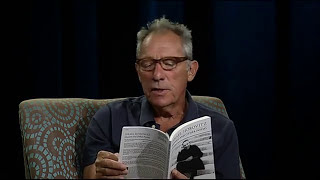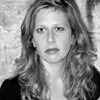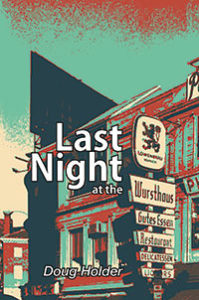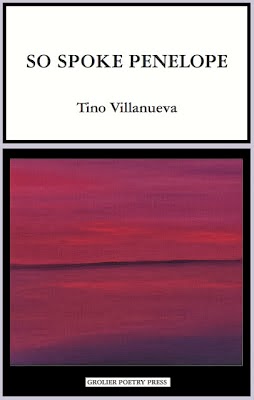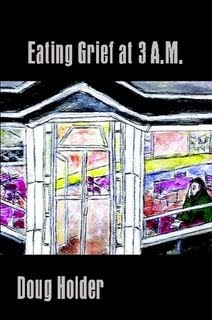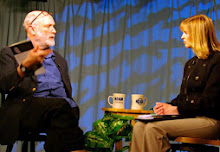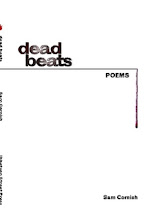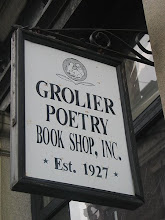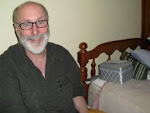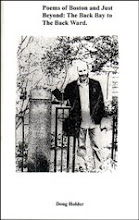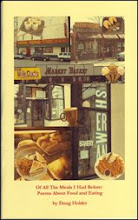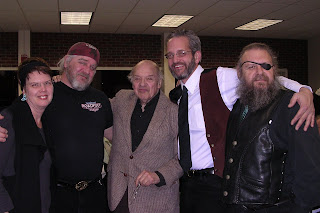 ( Joe Gouveia second from right)
( Joe Gouveia second from right)Rubber Side Down- The Biker Poet Anthology
Archer Books, Los Angeles, 2008
195 pages
ISBN: 978-1-931122-19-1
Review by Stephan Delbos ( Prague Review)
Rumbling straight from the back roads of literature comes this energetic collection of biker poetry, edited by Massachusetts biker poet Jose “JoeGo” Gouveia. Featuring photos by Michael Lichter, biographical essays, retrospectives and 73 poems from 43 poets from North America, the Netherlands, China, Russia and South Africa, “Rubber Side Down” is both all-inclusive and exclusive; the poets are born of diverse backgrounds, from highwaymen to professors, but all are passionately united by their love of leather, motorcycles and the open road.
And it is passion that comes through most undeniably in the poems of this anthology, passion as clear as the rumbling of straightpipes down Main Street. And this is fitting, for, as MarySusan Williams-Migneault writes in her poem “Biker Poetry is more…:” Biker Poetry is the engine firing up/ blasting across the horizon/ stretching out before you waiting.” It is motion and emotion these poets are most concerned with, and at times the desire for speed seems more important than impeccable craft.
Though the poems vary in form, featuring loose free verse, rhyming ballads, and even “Baiku,” a clever twist on traditional haiku, the constant is a desire to relate a story, be it a memory, a biker legend, or a moment of intense or comical perception. The latter are presented most clearly in the aforementioned “Baiku,” which vary from the comic: “Laconia run/ to the strip to see the show/ bikes and boobs abound!,” to the meditative: steel rubber and chrome/ roaring through concrete jungles/ thunder storms roll in.” These Baiku by Jose Gouveia show just two of the multiple variations on the theme of Biker poetry.
It is clear that these poets are united in their subject matter, just as it is clear that they have little or no desire to be accepted by the academy. But this anthology represents not just a ramshackle collection of poems by men and women on motorcycles. Rather, this anthology, the first of its kind, is both a roadmap and a road: an historical record of Biker Poetry and a path toward a more organized and represented movement.
According to essays in the anthology, The Biker Poetry movement has its roots in the late sixties and early seventies, when The Hell’s Angels reached their highest point of notoriety. At this time, cultural representatives such as Allen Ginsberg and Hunter S. Thompson, to whom the anthology is dedicated, produced representative texts on bikers and biker poets. Since then, the movement has literally cruised the great American highways, coming to fruition at various times in magazines and readings. Not until “Rubber Side Down,” however, has the movement had such inclusive and organized representation. There can be little doubt that the movement will continue to gather strength and that this anthology will serve as a touchstone for future publishers.
Though the themes and presentation of biker poetry may not be for everyone, these poets are undeniably active, even if until now their activity has mostly been within their own circles. “Rubber Side Down’ is an infectious collection of passionate, energetic poems, a must-read for anyone who rides and writes, or anyone who wants to keep abreast of burgeoning underground movements in American poetry. It is wise to remember the words of the late Thom Gunn, whose “On the Move ‘Man You Gotta Go’” is the first poem in the anthology: “One is always nearer by not keeping still.”





